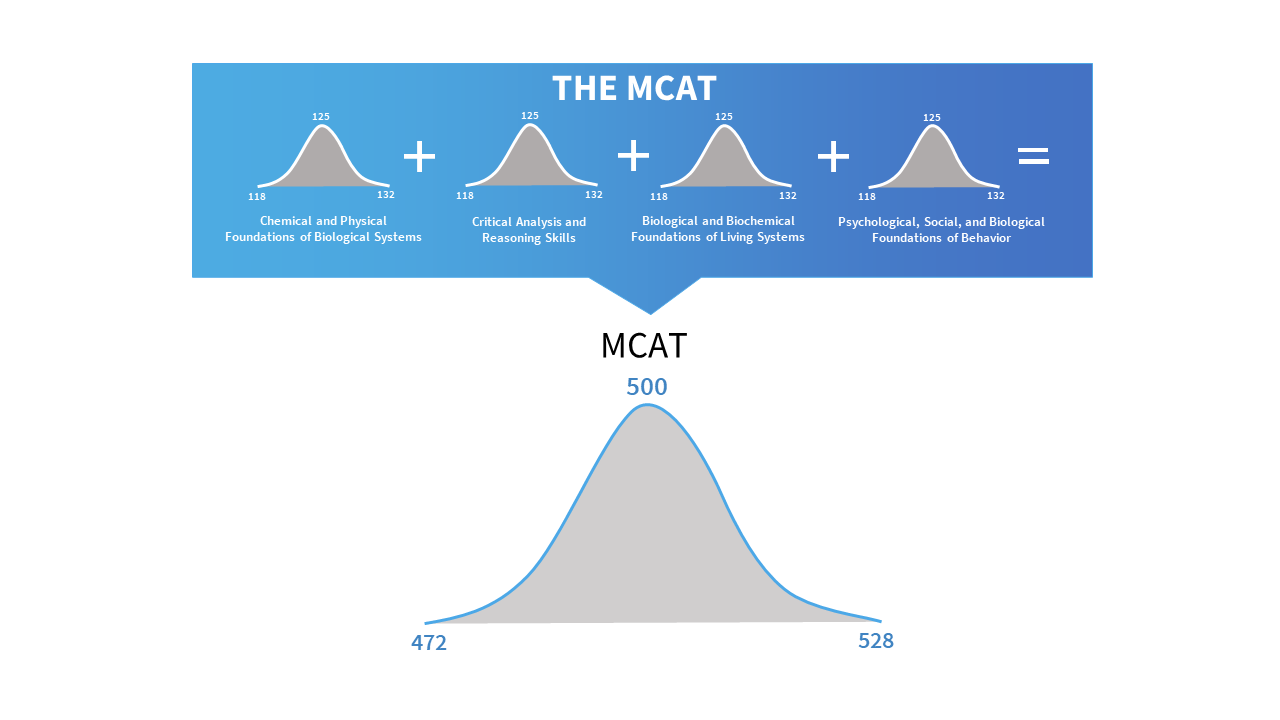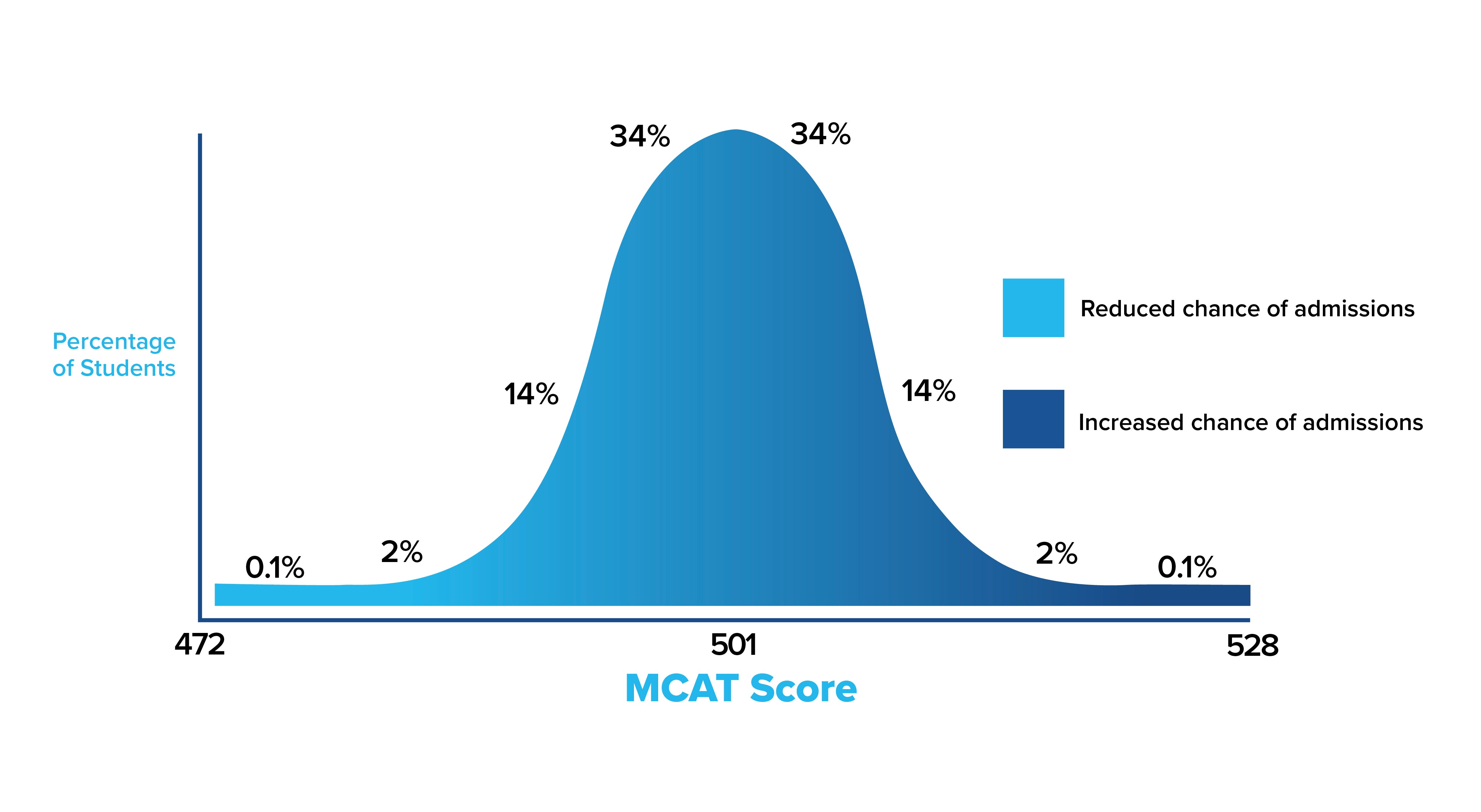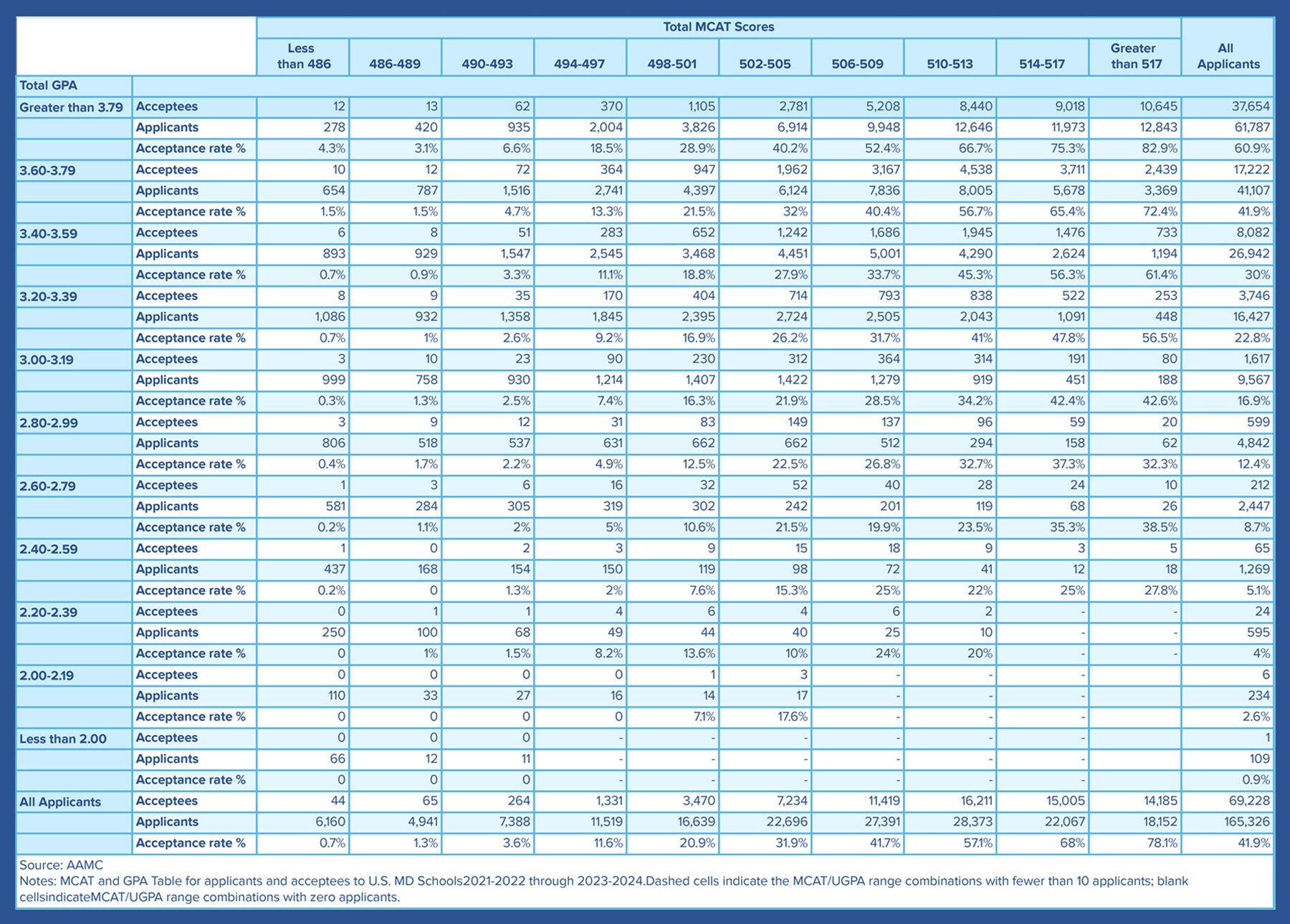MCAT Scoring Guide
Are you about to take the Medical College Admission Test and wondering what the passing score is? Or what is a good MCAT score to get into the medical school of your dreams?
This standardized, multiple-choice examination is designed to assess the examinee's problem-solving, critical thinking, and knowledge of natural, behavioral, and social science concepts and principles. That said, the complexity of the MCAT isn’t restricted to just the questions being asked. Simply understanding how this test is scored can be a bit confusing, but don’t worry! We’re here to shed some light on this mystery.
Firstly, it should be noted that the MCAT comprises four sections, each scored individually.
- Biological and Biochemical Foundations of Living Systems (Bio/Biochem)
- Chemical and Physical Foundations of Biological Systems (Chem/Phys)
- Psychological, Social, and Biological Foundations of Behavior (Psych/Soc)
- Critical Analysis and Reasoning Skills (CARS)
Table of Contents
How is the MCAT Scored?
Each MCAT section is scored on a scale ranging from 118 to 132, with the median score being 125. The scores from all four sections are then added together to give a total score ranging from 472 to 528. The cumulative MCAT score provides a comprehensive representation of an individual’s performance across all areas of the exam.


MCAT Percentiles
Percentile ranks are another critical aspect of the MCAT scoring system. These ranks provide a means of comparing one’s performance to that of other test takers within the same testing year.
For instance, a percentile rank of 85 (or being in the 85th percentile) means that the test taker performed better than 85 percent of the individuals who took the same MCAT.
| Total Score | Percentile Rank | Total Score | Percentile Rank |
| 472 | <1 | 502 | 52 |
| 473 | <1 | 503 | 56 |
| 474 | <1 | 504 | 59 |
| 475 | 1 | 505 | 62 |
| 476 | 1 | 506 | 66 |
| 477 | 1 | 507 | 69 |
| 478 | 2 | 508 | 72 |
| 479 | 3 | 509 | 75 |
| 480 | 3 | 510 | 78 |
| 481 | 4 | 511 | 81 |
| 482 | 5 | 512 | 83 |
| 483 | 6 | 513 | 86 |
| 484 | 8 | 514 | 88 |
| 485 | 9 | 515 | 90 |
| 486 | 9 | 516 | 92 |
| 487 | 11 | 517 | 94 |
| 488 | 14 | 518 | 95 |
| 489 | 16 | 519 | 96 |
| 490 | 18 | 520 | 97 |
| 491 | 20 | 521 | 98 |
| 492 | 23 | 522 | 99 |
| 493 | 25 | 523 | 99 |
| 494 | 28 | 524 | 100 |
| 495 | 31 | 525 | 100 |
| 496 | 33 | 526 | 100 |
| 497 | 36 | 527 | 100 |
| 498 | 39 | 528 | 100 |
| 499 | 43 | ||
| 500 | 46 | ||
| 501 | 49 |
Source: AAMC
Note: The column labeled “Percentile Rank” provides the percentage of scores equal to or less than each score point. These percentile ranks are based on all MCAT results from the 2020, 2021, and 2022 testing years combined. For example, 72% of MCAT total scores were equal to or less than 508 across all exams administered in 2020, 2021, and 2022 combined.
It is also important to note that medical schools do not solely rely on MCAT scores when making admissions decisions. While a high score can boost an application, schools also consider other factors like academic records, personal statements, letters of recommendation, and interview performance.
Frequently Asked Questions
What is the Highest MCAT Score?
The highest possible score on the MCAT is a scaled score of 528. While challenging, this can be achieved by scoring 132 on each of the 4 sections of the test, adding to the “perfect” score of 528. This does not mean you have to get every answer correct on the exam. Due to the nature of the exam being scaled, it’s possible to achieve a 528 and still miss a few questions!
What is a Good MCAT Score?
A good score on the MCAT is often considered to be a 511 or above, with each of the four individual MCAT sections averaging 128 or higher. This score will put you right in line with the average MCAT score of students who have been accepted into medical school.
However, if you’re looking to be above average, a score of 515 or above will put you in the 90th percentile, which will look great on your application!
It’s important to remember that the definition of a “good” MCAT score can vary depending on individual goals and the specific requirements of different medical schools. We encourage everyone to look into the average MCAT score of the schools you’re interested in applying to and use that to set a goal score for yourself at the beginning of your MCAT prep.


Based on data from the AAMC, we can estimate that a medical school applicant's chance of admission increases the higher their MCAT score is. However, no MCAT score can guarantee admission. GPA and soft application factors (such as personal statement, letters of recommendations, and activities) also play a significant role in the admissions process.
What is the Average MCAT Score?
An MCAT score of 500 is considered the average MCAT score, averaging 125 on each of the 4 sections of the test. Due to the way the AAMC scales their scores, the majority of students will end up in the middle of the curve with a score close to 500.
This means breaking out of this score plateau will be harder, since you have to do better than a higher volume of test takers here to make more of a difference. Compare this to the upper percentiles, 515+, where a fewer amount of correct answers results in a larger score improvement.
| Average MCAT Score Acceptable For Some Medical Schools | Average MCAT Score Acceptable for Most Medical Schools | Average MCAT Score Acceptable for Top-Ranked Medical Schools | |
| Informally | Average MCAT Score | Good MCAT Score | High MCAT Score |
| Percentile Rank | 50th Percentile | 80th Percentile | 95th Percentile |
| Section Score | 125 | 128 | 130 |
| Total Score | 501 | 511 | 518 |
Source: AAMC
Note: "Average score" does not mean cutoff or minimum score. Instead, it refers to the mean of accepted students' scores for medical school. No given MCAT score can guarantee admission to medical school, as acceptance depends on GPA, the rest of your medical school application, and the medical school interview.
What is the Lowest MCAT Score?
The lowest possible score on the MCAT is 472. This score represents the sum of the minimum possible score of 118 in each of the four sections of the test.
However, it’s important to note that there is a big difference between the “lowest score” and the “lowest score that is still considered competitive.” Most medical schools will only consider scores between 490 - 495 at the minimum. Applying with a score below this threshold is not recommended.
Is the MCAT Graded on a Curve?
In the scoring process, the “raw” score, which is the number of questions answered correctly, gets converted into a “scaled” score. This conversion allows for the standardization of scores, making it possible to compare performances across different test dates.
So, if someone has told you that you can miss 6 questions in a given MCAT section and get a scaled score of 128, that's not always the case. The truth about MCAT scoring is that missing six questions could equate to a score of 131 or it could be a 125, depending on the test difficulty.
Essentially, this is how the Association of American Medical Colleges (AAMC) keeps everything fair and balanced, even if some tests are slightly harder than others.
MCAT Scores for Medical Schools
Understanding the median GPA and MCAT scores of a medical school provides significant insights for an applicant. The median GPA is the point where half of the accepted students of an incoming class have a higher GPA and the other half have a lower one. Similarly, the median MCAT score is the midpoint of the MCAT results of accepted students. These numbers serve as benchmarks, providing applicants with an understanding of the academic and admissions standards of a given medical school.
For medical school applicants, these median scores can also act as indicators of competitiveness. If your GPA and MCAT scores are close to or exceed the median values, there is a higher likelihood of receiving an acceptance from that school. However, if your stats are significantly below the median, the chances of acceptance may decrease.
Other factors such as personal statements, letters of recommendation, interviews, and extracurricular activities also play crucial roles in the selection process. Your stats do not guarantee an acceptance or rejection from a medical school.
GPA MCAT Grid


Applying to medical school is as much a science as the content you’ll encounter on the MCAT. Strategically applying to schools will help increase your chances of acceptance. Creating a targeted medical school list with schools where the median GPA and MCAT scores match or are just slightly above yours can save you time and resources.
Create your medical school list with a balanced mix of safety schools, reach schools, and your target schools. You can use the Medical School Admission Requirements database (MSAR) to help you craft your list and compare your stats to each school’s admission requirements, or use the median GPA and MCAT scores of the top 20 medical schools in the U.S. as a guideline to get started.
| Top 20 Medical Schools | State | Median GPA | Median MCAT Score | Acceptance Rate |
| Harvard University | MA | 3.95 | 520 | 3.2% |
| Johns Hopkins University | MD | 3.96 | 521 | 6.3% |
| Stanford University | CA | 3.89 | 518 | 1.4% |
| University of Pennsylvania (Perelman) | PA | 3.95 | 521 | 3.8% |
| Columbia University | NY | 3.9 | 522 | 1.94% |
| University of California--Los Angeles (Geffen) | CA | 3.74 | 512 | 2.9% |
| Yale University | CT | 3.9 | 521 | 5.5% |
| Duke University | NC | 3.9 | 515 | 2.9% |
| New York University (Grossman) | NY | 3.97 | 523 | 2.7% |
| Washington University in St. Louis | MO | 3.88 | 519.5 | 7.5% |
| University of Washington School of Medicine | WA | 3.75 | 511 | 4.5% |
| Weill Cornell Medical College at Cornell University | NY | 3.91 | 519 | 3.4% |
| University of Michigan--Ann Arbor | MI | 3.84 | 5.16 | 3.6% |
| University of Pittsburgh (UPSOM) | PA | 3.84 | 517 | 4.2% |
| Northwestern University (Feinberg) | IL | 3.92 | 520 | 1.85% |
| University of Chicago (Pritzker) | IL | 3.91 | 521 | 3.2% |
| Vanderbilt University | TN | 3.95 | 521 | 4.5% |
| University of California--San Diego | CA | 3.83 | 515 | 3.4% |
| Icahn School of Medicine at Mount Sinai | NY | 3.87 | 519 | 3.4% |
| Boston University | MA | 3.82 | 517 | 4.1% |
Source: Rankings provided by College Consensus. Mean data provided by USNWR and individual schools' admissions websites.
Note: Medical schools are often ranked due to practice or focus. The rankings provided by College Consensus combined the results of various popular rankings.
